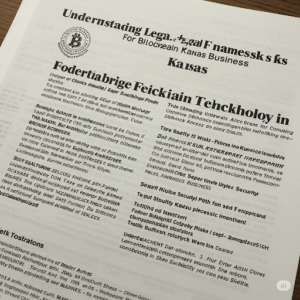
Blockchain technology is transforming business operations, offering enhanced security, transparency, and efficiency. However, Kansas businesses integrating blockchain must navigate evolving legal frameworks to ensure compliance and mitigate risks. Here’s what business owners need to know:
- Kansas Blockchain Legislation
Kansas has introduced laws addressing blockchain applications, including provisions for business entity regulations, digital transactions, and record-keeping. Businesses must comply with state-specific requirements when utilizing blockchain for financial or operational purposes.
- Smart Contracts and Enforceability
Smart contracts—self-executing agreements stored on blockchain—must align with Kansas contract law. While legally recognized, businesses should ensure clear terms, dispute resolution mechanisms, and compliance with state regulations.
- Data Privacy and Security
Blockchain transactions involve sensitive data. Kansas businesses must adhere to privacy laws, cybersecurity standards, and consumer protection regulations to safeguard digital assets and customer information.
- Taxation and Financial Reporting
Kansas tax laws may apply to blockchain-based transactions, including cryptocurrency payments. Businesses must ensure proper financial reporting, tax compliance, and adherence to evolving regulations.
- Regulatory Uncertainty and Compliance
Blockchain regulations continue to evolve. Kansas businesses must stay informed about federal, state, and industry-specific laws to avoid legal challenges and ensure operational security.
- Intellectual Property and Blockchain Innovations
Businesses developing blockchain solutions must secure patents, trademarks, and copyrights to protect proprietary technology and prevent unauthorized use.
For expert legal guidance on blockchain compliance, contact Business Law Group
Contact Us Today:
Name: Business Law Group
Address: 4901 W 136th Street, Suite 220, Leawood, KS 66224
Phone: (913) 225-8215
Website: https://kcbusinesslawgroup.com/

